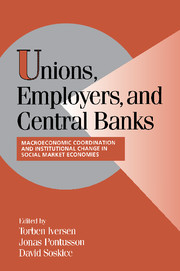4 - Postwar Wage Setting in the Nordic Countries
from Part 1 - Wage Bargaining
Summary
The Nordic countries have commonly been considered models of highly centralized systems of wage bargaining. In the American literature, they are known as exemplars of corporatism, the polar opposite of such decentralized systems of wage setting as the United States. Yet, as the editors to this volume suggest in their introductory essay, a decentralization of wage setting is generally believed to characterize the corporatist countries of Northern Europe in the 1980s and 1990s. In this chapter, we investigate whether such a decentralization has been underway in Denmark, Finland, Norway, and Sweden.
Why should the level of wage setting matter? One reason is that it is believed to affect economic efficiency and macroeconomic performance. This has been a controversial issue, one that has generated wildly divergent views on the merits (or conversely the deficiencies) of bargaining centralization. On one side are those who believe that centralized negotiations improve economic performance by allowing wage setters to incorporate various externalities into their decisions that would otherwise be ignored by actors who have only local responsibilities. On the other side are those who believe that any centralized system of wage determination is likely to suffer many of the same informational and incentive failures as central planning.
Recently, however, many scholars have assumed a more qualified and historically contingent stance, proposing that centralized bargaining, while not in principle inefficient, has become less efficient or less feasible over time. According to this line of argument, centralized wage-setting institutions worked well during Europe's “golden age,” or the first three decades after the Second World War. However, in the years since the first oil shock of 1973-74, so the argument goes, European economies have changed in ways that have reduced the efficiency of centralized wage determination. As a result, it is argued, wage setting, where it was not already decentralized, is undergoing a general tendency toward decentralization.
The alleged causes of such changes are said to be multiple. They include changes in production techniques, changes in occupational structures, and the increased integration of world markets. Domestic and international factors are both believed to be at work in shifting the preferences of employers away from centralized bargaining arrangements.
- Type
- Chapter
- Information
- Unions, Employers, and Central Banks , pp. 107 - 137Publisher: Cambridge University PressPrint publication year: 2000



